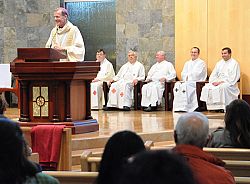Pastoral Congress enlightens the faithful
Friday, Oct. 03, 2014
DRAPER — The annual bilingual Diocese of Salt Lake City Pastoral Congress, “Joy Ever New: La Alegria Siempre al Dia” brought about 500 faithful parishioners, guests and local and national speakers to the Skaggs Catholic Center Sept. 27.
By virtue of our baptism, “we are called to evangelize,” said the Most Rev. John C. Wester, Bishop of Salt Lake City. “These kinds of congresses inspire and encourage people to be with fellow Catholics who are passionate about their faith, to support and encourage one another and to hear wonderful speakers. It enlightens our faith by participating. I’m delighted to see so many people here.”
The congresses began when Bishop Joseph Lennox Federal attended the Second Vatican Council and saw how a yearly gathering of Catholics was an appropriate response to the spirit of the Council.
“It was originally the Religious Education Congress, but under Bishop Wester it has evolved into a Pastoral Congress open to everyone,” said Susan Northway, Religious Education director for the Diocese of Salt Lake City, who helped organize the Congress.
The congress began with morning prayer followed by a keynote address by Hosffman Ospino, Ph.D. (See story, below.)
Bishop Wester concelebrated Mass at Saint John the Baptist Parish with Monsignor Colin F. Bircumshaw, vicar general; Monsignor Joseph Mayo, pastor; Father Patrick Elliott, Holy Family Parish pastor; Father John Evans, Saint Thomas More Parish pastor; and Father Jose Barrera, Cathedral of the Madeleine parochial vicar.
In his homily, Bishop Wester said in Luke’s Gospel Chapter 9, “we are called to acknowledge Jesus as Lord, and to see who we truly are through his eyes, which isn’t easy because we tend to put ourselves at the center of our lives. When we look in the mirror, what we see is distorted; but when we look through a window, Jesus gazes upon us and we see our authentic self.”
The bishop continued, “We are baptized into a community of believers. By praying, we will be able to see Jesus in the eyes of the other, grow and accept new life.”
Participants attended three workshop sessions, some of which were based on seeing Jesus in the other.
Jean Hill, diocesan legislative liaison and chair of the diocesan Commission on Peace and Justice, presented “Economic Justice for All.” Because we have more resources, we are more responsible to others, and “we are charged to care for all people, to protect human life and all of Creation,” she said.
The principles of justice are: commutative justice, distributive justice and contributive justice. Commutative justice is treating each other with fairness. Distributive justice is the nature of a socially just allocation of goods in a society. Contributive justice involves ensuring that all members of a society are able to participate within their community, Hill said.
The same was true in Deacon Sunday Espinoza’s and Carol Ruddell’s workshop, “Welcoming All to God’s Grace in the Sacraments.” Parish programs have to be as inclusive as possible to catechize; receiving the sacraments can be difficult when one has a disability, but by preparing for, learning about, and by being creative, everyone can receive the sacraments, they said.
Workshops on planning liturgies and prayer included Lectio Divina and the Divine Mercy chaplet.
“It is only by trusting in Jesus that we receive the grace of his mercy,” said Mary Gesicki, who explained the history of and how to pray the chaplet using rosary beads.
Jesuit Father J. Santiago Rodriguez presented the workshop “The Daily Examen: Tsunami of the Holy Spirit,” in which he said sometimes prayer can be a scary proposition because “we don’t know what is going to come out of it. Sometimes it’s upsetting.”
Fr. Rodriguez led participants through an Ignatian spiritual exercise called the Examen, in which there is consolation: faith, hope and peace; and desolation: turmoil.
In the workshop “I’m Spiritual, Not Religious,” Leisa Ainslinger, co-director of Catholic Life and Faith, said people who use this expression “feel they don’t belong, but the majority are coming to Mass; they are just not making that connection between their faith and the rest of their lives,” she said. “When people have a deep sense of belonging in their parish, they are more likely to be spiritually committed. … There are three bridges we can build: welcome, friendship and sharing.”
Greg and Julie Alexander, marriage coaches, offered the workshop “Healing Your Marriage.” They suggested parishes support married couples by implementing a ministry that offers continuing education and enrichment, supplemented with parish activities such as a date night.
The panel of Fr. Evans, William Trentman, Juan Diego CHS theology chair; and Jill Luttrell, Saint George Parish DRE, discussed the diocesan curriculum for Catholic schools as an extension for youth programs. “It is designed to offer all the teaching activity resources for teachers and catechists so they can provide a 15-minute lesson once a month on stewardship,” said Fr. Evans. “It’s a lesson progression from kindergarten through 12th grade. Kindergarten through eighth grade is complete and can be downloaded from the diocesan website; it will soon be available in Spanish.”
Freeman Robbins, a Saint James the Just parishioner, liked this workshop because he is involved with many of the youth projects in his parish, especially Boy and Girl Scouts, and they like to give back to the community throughout the year, he said.
For questions, comments or to report inaccuracies on the website, please CLICK HERE.
© Copyright 2024 The Diocese of Salt Lake City. All rights reserved.
© Copyright 2024 The Diocese of Salt Lake City. All rights reserved.


Stay Connected With Us